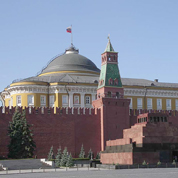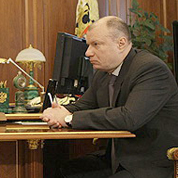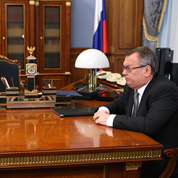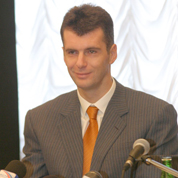Kremlin pressurizes ‘egoistic creditors’ into debt renegotiations mood

This is evident in the concrete actions of heads of banking groups and other influential corporations, who have now declared interest in seeking constructive compromises in their stalemated negotiations with corporate debtors, whose business operations and collateralized assets have been seriously devalued by the global economic meltdown in and outside the country.
Russian economy on a ‘manual management’ regime
Indeed, most observers would have noticed that the Kremlin has long shifted to ‘manual management’ of the economy, evident in its active and frequent interventions on the local market, since the global financial crunch derailed the normal functioning of the conventional monetary and fiscal mechanisms that usually keep sound economies running effortlessly in normal times. Thus, receiving a status report on the execution of the government’s anticrisis programs from First Deputy Prime Minister Igor Shuvalov in March, President Dmitry Medvedev said the government will henceforth more closely monitor how banks that have received huge state funds are providing businesses and individuals with affordable liquidity needed to spur the crisis-hit economy into accelerated recovery. 
More specifically, the president warned that his administration will not condone situations, where creditors’ demands could undermine the stable functioning of the so-called ‘systemic corporations’ — a term for companies that form the backbone of the nation’s economy — and, especially in time of unprecedented global economic recession. “A situation, where organizations or creditors can stop the normal functioning of large corporations will be totally unacceptable,” the president warned. “I have already proposed using the full force of state coercion to achieve these goals, including amending the relevant laws to do so, if and when necessary.”
Alternatively, the Kremlin plans to work on an individual basis with creditors so as to spur them to feasible compromises with delinquent corporate debtors, but the overall message will be that the government will never allow the interests of large enterprises, employing several thousands of workers, to be sacrificed on the alter of financial organizations’ egotistic ambitions. “It is high time that financial organizations demanding pre-term debt repayments desisted from the practice of corporate egoism,” Medvedev said, warning, “if they do not understand this, then we shall be forced to look at these issues, but from a totally different point of view.”
Indeed, the Kremlin was particularly irked by the actions of financial organizations owned by structures affiliated with oligarchs’ businesses that had received several billions of rubles in government’s anticrisis financial aid, which have either failed to provide easily affordable loans to smaller companies and much needed liquidity to other banks, as required by the state’s bailout programs. Also, these companies have assumed uncharacteristically tough positions on renegotiating new repayment conditions with battered corporations seen as the ‘backbone’ of the local economy, thus jeopardizing the country’s social, political and financial stability in conditions of worsening global economic crisis that has yet to peak. These Kremlin warnings, which were later bolstered with several tet-a-tet meetings between top Russian political leadership and key business owners in the country, have now led to positive changes in positions of most financial institutions and other corporate entities on the debt repayments and other related issues.
Deripaska a key beneficiary from the Kremlin’s initiatives
Notably, Basic Element (BasEl) is one of these ‘special systemic corporations,’ so-called “the untouchables” for their pan-economic influence, as their bankruptcies could tip the whole domestic economy over the cliff into an abyss, sending thousands of workers on to the streets. As further events showed, BasEl’s principal shareholder, Oleg Deripaska, has turned out to be one of the key beneficiaries of the government’s mounting pressures on banks and other corporate creditors to be more flexible in their negotiations with their delinquent debtors. The Kremlin initiatives must have certainly come at the right moment for Deripaska, because, according to various reports and media sources, the total debt accumulated by companies affiliated with his BasEl currently stands at staggering $20bln. “However, BasEl’s real part of the total debt is much lower, because it does not own 100 percent stakes in all the companies affiliated with it,” according to BasEl First Deputy CEO Olga Zinovieva. 
It is particularly interesting to note that prior to the Kremlin meeting, Russia’s business media were ablaze with widespread speculations over the looming legal battles between companies affiliated with BasEl and those associated with other leading Russian business tycoons such as MMK, NLMK, Alfa Group, etc. Specifically, the speculations had it that the defaults in payments have put BasEl and Mikhail Fridman’s Alfa Group, Alexei Mordashov’s Severstal Holding and Vladimir Lisin’s NMLK on inevitable litigation courses that would have sent strong negative ripples across the whole economy. This is because these companies had unequivocally threatened to redeem their debts through litigations. “In the absence of payments by GAZ of its debts to NLMK, we are ready to take all measures against it, including the initiation of bankruptcy procedures, to redeem about R1bln of our debts,” Lisin said. Meanwhile, MMK filed two legal suits against GAZ, asking the Nizhegorod arbitration court to force the automaker to repay its debts of over R1bln Altogether, 10 such suits are reportedly pending against GAZ in that court.
Similarly, Alfa Group was also contemplating litigation to redeem over $650mln debt from BasEl’s subsidiaries, but now such plans have been shelved. Indeed, one of the immediate positive results of the Kremlin’s actions was the ‘quenching’ of the row between Deripaska and Fridman over the former’s companies’ multimillion-dollar debt defaults. However, the tycoons have now backed down from the mutually destructive, ‘winner-takes-all-litigation’ course of actions. “It important to note that we, as shareholders of these companies, have good friendly personal relations. Thus, the information about some conflicts between us or our businesses are completely baseless and far from reality,” according to a joint official statement that specially underscored the ‘friendly and normal business relations’ between Deripaska and Fridman, which was released by the business tycoons immediately after Fridman’s televised meeting with the Russian president in the Kremlin. “Some of BasEl subsidiaries have actually defaulted in their payments to Alfa Bank due to the global financial crisis. The companies are searching for the optimal solutions to all problems connected with meeting their credit obligations and they support constructive business relations with their creditors.”
The readiness of all or some of these creditors to back down from their previous plans of using court actions to redeem their debts must be ‘some nice music’ at BasEl and its financially starved subsidiaries. This is because positive court rulings on those lawsuits would have probably included immediate repayment orders, freezing the defaulted companies’ accounts for sometime and/or transferring the assets used to collateralize these loans to the creditors. It is quite clear that any of such actions would have pushed Deripaska’s seriously weakened business empire into a financial void with little or no chance for eventual recovery. This would have been a catastrophic outcome for Deripaska, as such actions would have further seriously complicated his already devastating financial position in and outside Russia, following his reported loss of multibillion-dollar assets to the current crisis. 
Other good news for Deripaska
BasEl is currently considering different variants of resolving its gigantic debt problems – pay up in cash, using companies’ liquid assets to collateralize new loans to settle the old ones, and finally, restructuring the multibillion-dollar debts through active negotiations with creditors.
And, it seems that more creditors are now willing to understand BasEl’s difficult financial position. Thus, Mikhail Prokhorov’s Onexim Group has agreed to increase its stake in RusAl, Deripaska’s creme-de-la-creme asset in the Russian and global metallurgical industries, from 14% to 18.5%, as a part of restructuring the $2.8bln debt owed by the aluminum giant. Specifically, $2bln of these debts will be converted into shares, while the rest will be restructured, the business tycoons said in a joint statement, thus giving a ‘shot in the arm’ to the oligarch’s financially distressed metals giant. Also, RusAl has been able to negotiate the so-called ‘standstill’ cooperate agreements to temporarily halt repayments of billions of dollars owed to local and overseas-based international banking groups such as Citigroup, Merill Lynch and BNP Paribas. Some of these payments would have been due in the next couple of months.
Similarly, the Deripaska empire has also got strong support from German Gref, the president of Sberbank, the nation’s largest savings bank, who has declared his readiness to restructure the loans owed by GAZ, a major BasEl subsidiary, which has also been severely hit by the global crisis. Apart from the debts owed to Russian state banks, GAZ is also deeply indebted to several privately owned banks such as Gazprombank, Raiffeisenbank, UralSib, etc. and is also heavily indebted to its raw-materials and accessories suppliers, including MMK, NLMK, Severstal, Sollers and SOK, all of which are demanding repayments, threatening bankruptcy in absence of payments. However, Gref said bankruptcy of the autoplant is not the best option on the table. “We have agreed to restructure GAZ’s loans, and we are already to persuade other investors to listen to our position on this issue, and that is we just cannot bankrupt this company and throw its over 115,000 employees on the street.” Besides, Gref is confident that state-owned banks such as Sberbank, VTB and VEB, which collectively hold about a 27% stake in the automaker, can renegotiate the new debt-repayment terms for the ailing automaker to save it from unregulated collapse. “We shall only take drastic measures, if there are attempts to siphon off the company’s liquid assets,” Gref warned.
BasEl empire exudes optimism, despites gloomy times
The good news at this moment is that GAZ, RusAl and other BasEl’s financially distressed subsidiaries are far from throwing up the ‘white flags’ and caving in to the global crisis, optimism that has been explicitly expressed in the company’s official statement. “We are in an active stage of negotiating long-term restructuring of debts with our creditors with the end goal of reducing the debt burden. At the same time, we are executing programs aimed at improving our plant’s production efficiency. All these measures will enable us overcome the negative impacts of the global crisis.” 
The only hope now is that the ‘shrewd oligarch’ can once again tap into his ‘phenomenal ingenuity’ and the ‘uniqueness’ of the prevailing special circumstances on the domestic and international markets much the same way that he used similar situations in the 1990s to create one of Russia and world’s largest financial empires out of the ashes of the collapsed Soviet communist economy. The task this time around is much more difficult, because he will not only be keeping his businesses from being gulped in the flames of the agonizing Bretton Woods-style capitalism, but also ensuring the continuous and prosperous existence of his influential, multi-profile industrial-financial group in the upcoming post-crisis era. This is a difficult, but by all means, attainable goal for an oligarch of the caliber of Deripaska.












 Web design,
Web design,